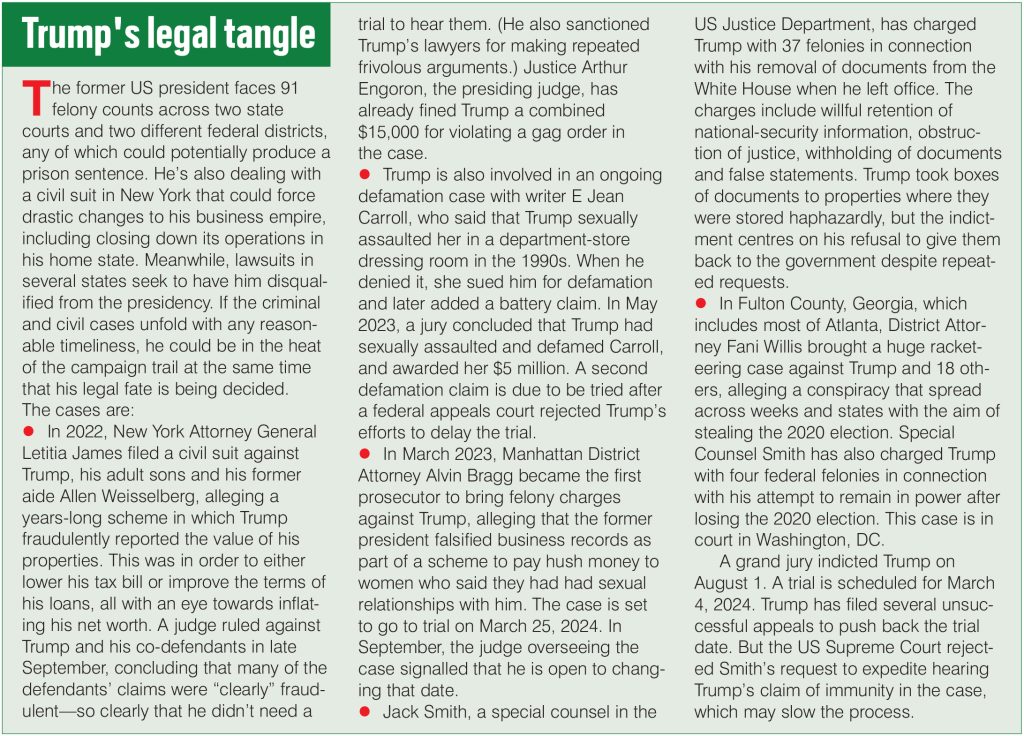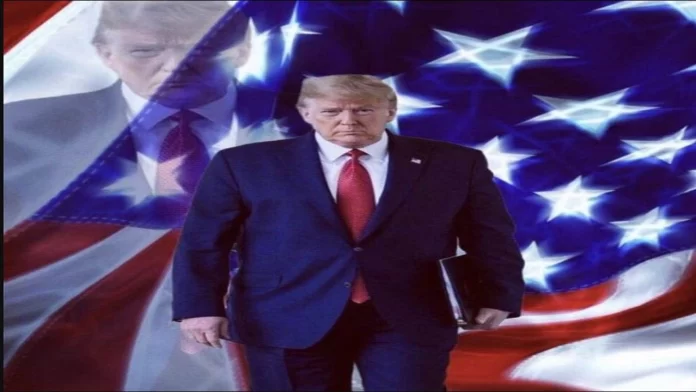The devotion Republican voters of Iowa felt for Trump was evident when he got 51% of the vote count. But will this idolization help him get presidential immunity against his many legal issues?
By Kenneth Tiven
Terrible winter weather in Iowa did not interfere with the devotion Republican voters feel for their former president, who is seeking to win back the presidency in November 2024. More than half the people who caucused put Donald Trump’s name on a slip of paper as their choice to run in November for another four-year term as president of the United States. No amount of legal trouble or rage-filled outbursts about a “deep state” trying to imprison him matter to the faithful. They see a bond, whereas others see a dangerous cult. The essence of a cult is that it defies logic, and that is operative with Trump.
Indian-American Nikki Haley, former governor of South Carolina, and Florida governor Ron DeSantis finished close to each other, a gain for her in terms of past performance; Vivek Ramaswamy, a biotech investor and an Indian-American, slipped into irrelevance and dropped out, endorsing Trump. The votes were as follows: Trump: 51.0%; DeSantis: 21.2% and Haley: 19.1%.
Analysis shows that the vast rural areas are strongly conservative, while the two major urban centres in Iowa are home to more moderate Republicans. That Trump is idolised by a percentage of Republican voters is not news. Context helps one to understand the recent votes. Weather played a role in keeping attendance down to 1,10,300 of an estimated 3,00,000+ Republicans registered to vote in Iowa. Lack of interest, political apathy…dozens of reasons exist for skipping this event. By comparison, 1,86,000 people caucused in 2020. But it’s just as likely that a substantial percentage of voters of all parties are more discerning in how a national leader should behave.

Democrats also held in-person caucuses on Martin Luther King Jr. Day, with no expression of presidential preference. Democrats are holding a mail-in ballot process, with results to be announced on Super Tuesday in March.
The Republican race for the 2024 presidential nomination began months ago with a surprisingly large field, but has rapidly winnowed down to this trio. Leading up to a US presidential election, Republicans and Democrats hold contests in each state to decide who their nominee will be. The winner in each state sends delegates who vote at the party conventions in the summer to choose the national nominee. The state elections are usually called primaries with a simple vote, but in some states, primarily Iowa, the election is based on a must-attend meeting format, after which people fill out paper slips naming their favourite.
Next week in New Hampshire, in the nation’s northeast corner, there is a possibility of bad weather. For Republicans, this is essentially a beauty pageant for the vice president for 2024. Trump’s quest is for a measure of presidential immunity against his many state and federal legal issues. That is not all that is at stake. Republican leadership is clear that it wants a Hungarian-style “democracy”, which is a dictatorship wearing a veil called “elections”.
The Iowa caucus is an artifact of 20th-century politics that tried to involve citizens in the nominating process. This farming state’s population is 3.2 million, larger than Pune and smaller than Hyderabad. It is one of the smallest US states by population. Around 95% of its citizens were born in Iowa, 84% are white. Demographics that do not represent the nation today.
Trump has ignored the Republican Party debates to emphasise that he controls the Party, making its officers powerless. However, his multiple legal problems will keep him in courthouses instead of at rallies courting voters (see box).
The Florida governor, Ron DeSantis, is learning that what plays well in Florida will underperform in the other 49 states. Voters recognise that while his policies are Trumpian, he lacks the charm and guile of Trump. Retail politics—differentiated from understanding policy and responsibility—have become essential elements of national political success for Republicans. For example, Trump fans talk about his strength and fortitude, whereas others describe a narcissistic bully with little grasp of serious issues.
Haley is close to DeSantis going into next week’s New Hampshire primary election (another small rural state) and is polling well there. She may be hoping to gain the vice presidential slot. Better yet if Trump is denied the ballot under a constitutional prohibition for involvement in the January 6, 2021, insurrection, in which case she’d be considered a logical presidential candidate.
Her campaign advertisement in New Hampshire asks. “Who are the two most disliked politicians in America”, and answers: “Trump & Biden”. She calls them two men “consumed by chaos, negativity and grievances of the past”. She might be correct, but does it matter?
People gave speeches supporting each candidate at the meetings in the 99 county precincts that make up Iowa. A young woman speaking for Trump said: “He’s very honest and forward.” Jessica Lewis explained that she wants “justice for the people to get what America needs back in this country. Safety. Connections. Better borders to keep drugs and gangs out. I believe we should protect what we have and make it stronger.”
For Trump, the outcome in Iowa was never in doubt. Courthouse events, however, are not so positive. Three female judges heard the immunity case. Patriarchy isn’t what it used to be at that level. At the Washington DC Federal Court of Appeals, Trump’s lawyers faced withering questions about their proposition that a president has absolute immunity for anything. Asked, could a president be prosecuted if he ordered the assassination of another candidate? The answer was a “qualified yes”, but only after being impeached and convicted. The fact is that impeachment is not a legal process, but a political one for the Congress to use internally escaped consideration.
Trump makes personal loyalty an essential element of his often disjointed moments of rage while speaking at a rally. Haley is increasingly a target. She was the ambassador to the UN selected by Trump early in his tenure, but whatever he liked then is long gone. “I’m working for you, and she’s working for a lot of other people. People that don’t necessarily love our country so much,” Trump told a rally.
At one rally, he repeated his false claim that the 2020 election was “rigged”. Trump took credit for Iowa’s first-in-the-nation status and claimed that “nobody took better care of the farmers than Trump”. The caucus system started in the late 1960s to give people more power over candidate choice. Trump was barely out of college then and too busy learning the real estate business from his dad in New York City to be aware of politics in Iowa.
Despite being president for four years, he sought to portray himself as a political outsider. He described Washington as a “rat-infested, graffiti-infested s—hole”. Focusing on a frequent theme of victimhood, he restated his allegations of a weaponised judicial system as he faces 91 criminal charges and four indictments. (Special counsel Jack Smith and Attorney General Merrick Garland have said Smith’s prosecutions were made independently of the White House, by Justice Department rules on special counsels.)
Trump’s rage at his continuing setbacks in court underlines this issue. In recent weeks, Trump has raged against several legal cases that threaten to cost him hundreds of millions of dollars, which he may not have, and the loss of his business empire, which would be the ultimate penalty for a man who says he hates losers.
He believes winning the presidency will bring back a measure of presidential immunity. The Supreme Court can either consider it or reject it, claiming the Appeals Court must first finish its ruling on the matter.
Interviews reported by The New York Times pointed out that some voters across the state are unhappy with their choices and feel that they’re moving through the motions in a simulation game. “He’s not shaking hands, and he’s not taking questions,” Bob Beatty, a political science professor at Washburn University in Topeka, Kansas, reportedly said. “Trump is campaigning as an incumbent, and it’s half working. And if you get half, that’s it.”
David Kochel, a longtime Iowa political strategist, predicted about 1,50,000 Iowans would show up on voting day, a figure in line with historical norms, but still just about 25% of the registered Republicans in the state. He cited Trump’s lead and the weather as the biggest factors.
Encapsulating the local malaise—albeit from the anti-Trump perspective—the Raygun clothing store in Des Moines is selling T-shirts with the slogan: “Election 2024: You’d think battling a fascist takeover of America would spark more interest from people.”
—The writer has worked in senior positions at The Washington Post, NBC, ABC and CNN and also consults for several Indian channels


